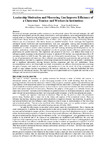| dc.description.abstract | Motivational strategies guarantee quality assurance in the educational system. Motivational strategies like staff training and development, promotion, salary, remuneration, working conditions, status and participatory decision making, acted as a barrier towards achieving quality assurance in the educational system. The study adopted the reinforcement theory based on Thorndike’s Law of effect, which simply looks at the relationship between behavior and its consequences. This theory focuses on modified behavior. Some challenges that negatively influenced teacher motivation and recommendations were also highlighted. Among such recommendations included: government recognition of teachers motivational needs such as promotion, good salaries and remuneration in order to achieve quality assurance; and staff training, retraining and development as one of teachers’ motivational needs/strategies strengthened in order to promote teachers efficiency, productivity and performance for quality outcomes. The importance and purpose of this work is to address these issues as it influences quality assurance in the educational system. A sample of 150 teachers was randomly drawn from 10 secondary schools in Kilifi County. The study made use of descriptive research design. The data was collected by use of questionnaires and interviews. Data collected was analysed both quantitatively and qualitatively. The findings indicated that there is a significant relationship between motivational factors and teacher’s’ performance and a significant relationship existing between teachers experience and their job performance. Some recommendations such as providing highly motivated, conscientious and efficient classroom teachers, encourage the spirit of enquiry and creativity in teachers, help teachers to fit into the social life of the community and society at large, enhance teachers commitment to the teaching profession etc, were also highlighted that have implications for educational practice. The study findings are of great benefit as it will guide and assist the school managers and the ministry in motivating teachers. | en_US |

